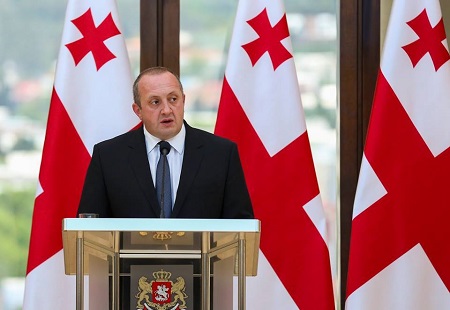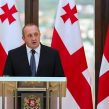
Office of Largest Opposition Party in Georgia Comes Under Attack
Publication: Eurasia Daily Monitor Volume: 12 Issue: 227
By:

On the night of December 9, unidentified assailants attacked an office of the most influential opposition party of Georgia, United National Movement (UNM), in the town of Dedoplistskaro, near the capital of Tbilisi (Civil Georgia, December 10). Former Georgian president (2008–2013) and the current governor of Odesa oblast in Ukraine (since May 2015), Mikheil Saakashvili, still chairs the UNM. Current President Giorgi Margvelashvili has recently signed a decree that stripped his predecessor of Georgian citizenship, citing Saakashvili’s adoption of Ukrainian citizenship (Georgiatoday.ge, December 4). Despite that development, one of the leaders of UNM, Nugzar Tsiklauri, told this author, on December 10, that “The opposition party does not have plans yet to elect a new chairman.” It is possible that Saakashvili will retain his status in the party until the parliamentary elections, which are scheduled for the fall of 2016.
Both the authorities and radical political groups inside Georgia have ramped up their pressure on UNM. The General Prosecutor’s Office has launched a new investigation against several previous officials in former president Saakashvili’s administration (Interpressnews.ge, December 12). But the pressure on the party took a violent turn early last week, when unidentified assailants fired shots at a regional UNM office in Dedoplistskaro. The same building also houses the offices of UNM parliamentarian Zaza Kadelashvili. The December 9 incident represents the kind of, presumably, politically motivated violence that Georgia has not seen in over 20 years, since the country’s civil war (1991–1993) and subsequent coup d’état. “The criminals fired shots at night when the building was empty. That is why luckily no one was hurt. When our party activists came in the morning, they found traces of bullet shots in the windows and called the police. The police arrived only after an hour, and they have not identified any suspects or detained anyone,” Tsiklauri recounted (Author’s interview, December 10).
UNM deputies raised the incident in the parliament and angrily asked why the criminal investigators had classified the shooting up of the UNM regional office as a case of “damaging someone else’s property” instead of “terrorism” (Info9.ge, December 10). David Darchiashvili, a member of parliament (MP) from the UNM, noted the uniqueness of the December 9 incident: “After the UNM entered the opposition [October 2012], extremists attacked our offices. They used eggs, rocks; sometimes they beat up regional activists. But no one has ever used fire arms until now.” According to the deputy, the attack in Dedoplistskaro was “a warning for the opposition about further upcoming violence.” Darchiashvili regards the authorities’ attitude toward the opposition as “utterly unacceptable and undemocratic.” Furthermore, he suspects that “the government secretly supports the extremist groups that carry out [such] violent attacks” (Author’s interview, December 12).
However, representatives of the ruling coalition, Georgian Dream, flatly reject all accusations of the opposition and unequivocally condemn any acts of violence, including the shooting at the party office in Dedoplsitskaro. “Such acts, whoever carried them out, are absolutely unacceptable and provocative and deserve condemnation and severe punishment. We reject any claims about the authorities’ involvement in such acts of violence,” one of the leaders of the ruling coalition, Zakhariy Kutsnashvili, stated. However, Kutsnashvili also dismissed the UNM deputies’ charge that the December 9 incident should have been classified as “terrorism.” He declared, “There was no one inside the building. The incident took place during the night, and no one was hurt… Hence, to regard the attack as a terror attack would probably be an exaggeration. In any case, it was an indicator of violence; and whoever uses violence, whatever the justification, it is absolutely unacceptable for me. Violence is not our style” (Author’s interview, December 11).
The speaker of the parliament, David Usupashvili, also condemned the attack and called on the law enforcement agencies to investigate the crime and severely punish its perpetrators. Still, the authorities have so far failed to react adequately to the incident. According to the Ministry of Interior, “despite an intensive search, the police has failed so far to identify and arrest the criminals” (Civil Georgia, December 10)
At the same time, the opponents of Mikheil Saakashvili and the UNM regularly claim that violence was a common attribute of the previous government and its supporters. One of the leaders of the antigovernment demonstrations in 2007–2009, film director Giorgi Khaindrava stated: “Now they [UNM’s leaders] attempt to cast themselves as innocent victims, but I will remind you that during the rule of the United National Movement, dozens of special groups were created out of former athletes and criminals who would attack the opposition and beat them up with sticks and iron bars” (Author’s interview, December 10).
President Saakashvili and his supporters never confirmed that groups of unidentified individuals who attacked some opposition politicians during antigovernment protests in 2007–2009 had any ties to the government (Ambebi.ge, March 29, 2012). Yet, one of the four criminal cases that were launched against Saakashvili after he left office specifically aims to tie him to such extralegal violent activities.
Specifically, the case involves businessman and former MP Valery Gelashvili (Agenda.ge, November 10, 2014). Interior Ministry special forces allegedly beat up Gelashvili in 2005, after he insulted the first lady of the country, Sandra Roelofs, in one of his interviews with the media (Vestikavkaza.ru, October 28, 2014). The General Prosecutor’s Office asserts that then–interior minister Vano Merabishvili and the head of the special police department, Erekle Kodua, ordered the attack. President Saakashvili was allegedly aware of the details of the attack. However, the accused UNM members dismiss these indictments, calling them “complete stupidity and absurdity” (Dfwatch.net, April 25).
Responding to the accusations, Saakashvili stated that no opposition leader was arrested under his rule, while the government of the Georgian Dream coalition put under arrest or issued international arrest warrants for many leaders of the UNM. The list includes Mikheil Saakashvili himself, former Tbilisi mayor Gigi Ugulava, and the General Secretary of UNM, Vano Merabishvili (The New York Times, July 5).
It is difficult for the supporters of the Georgian Dream coalition to deny the fact that last week’s armed attack on a regional office of the country’s main opposition party is unprecedented when compared to Georgia’s overall political environment over the last two decades. And if the Georgian political actors do not agree on civilized rules of game and a normal political competitive process devoid of violence, Georgian democracy could revert back to the turbulence and chaos of 20 years ago.




